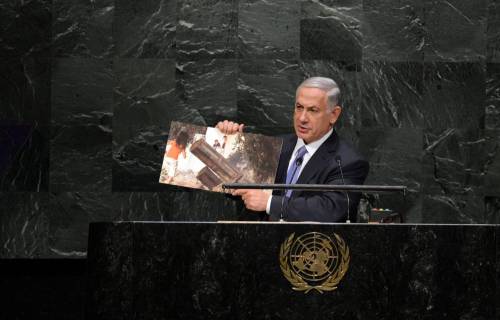Dr. Alon Ben-Meir, a professor of international relations at the Center for Global Affairs at NYU, comments on the new security situation in the Middle East

As Prime Minister, Benjamin Netanyahu aka Bibi has consistently invoked his solemn duty to protect Israel’s national security. Ironically, he has become the single most reckless individual who is imperiling the very security of the state. One need not look far and wide to discern Netanyahu’s disingenuousness and misguided policies that have only undermined Israel’s future security.
He uses his political skills to deceive and mislead in order to ‘protect himself from political defeat’ while disregarding what is best for the future of the state. He surrounds himself with cronies blinded by their skewed ideological zeal with no morals or scruples to support his sinister political agenda.
To be sure, Israel under Netanyahu’s stewardship is globally on the defensive, isolated, threatened from within and without, loathed and criticized by friends and foes alike, and with no prospect to achieve peace, which jeopardizes not only Israel’s security but its very existence.
By what measure can Netanyahu claim that the occupation of the West Bank enhances Israel’s national security? Nearly fifty years of occupation did nothing but poison the Palestinians, intensify their hatred and animosity toward Israel, and drive them to extremism, which gave birth to Hamas and an assortment of other jihadist groups.
How does the building of settlements and their expansion under the pretense of securing the borders provide Israel with better security? Thousands of soldiers are stationed throughout the West Bank to protect the settlers, making the settlements a security liability rather than an asset.
Moreover, the settlements became the source of the Palestinians’ resentment and violence, and their continuing expansion closes the window for a two-state solution. The settlements diminish the prospect of establishing a Palestinian state while risking Israel’s security and national identity and alienating the international community.
Instead of embracing the Arab Peace Initiative (API), especially now that the entire region is in turmoil and the Arab states are more eager than ever before to make peace, Netanyahu still rejects it irrespective of the fact that many current and former Israeli political and military leaders beseech him to embrace it.
By rejecting the API, Netanyahu has yet again forfeited another historic opportunity to negotiate, with some give and take, a lasting peace which more than anything else could radically enhance Israel’s long-term national security.
Netanyahu habitually ignored Israel’s Western allies’ pleas to moderate his policies toward the Palestinians and end the occupation. Frustrated and angered by his continuing violation of Palestinian human rights while usurping their territories inch by inch, the European countries have abandoned him.
The loss of the West’s moral and political support will have long-term security implications on Israel, as the country becomes increasingly isolated and ever more vulnerable to outside threats.
 Engrossed by his self-grandeur and lack of sensitivity, Netanyahu betrayed Jordan’s King Abdullah, Israel’s closet Arab ally and the custodian of the Muslim Holy Sites, by using the Temple Mount—the most sensitive area to both Jews and Muslims—to assert Jewish right to the site at a time of extreme tension.
Engrossed by his self-grandeur and lack of sensitivity, Netanyahu betrayed Jordan’s King Abdullah, Israel’s closet Arab ally and the custodian of the Muslim Holy Sites, by using the Temple Mount—the most sensitive area to both Jews and Muslims—to assert Jewish right to the site at a time of extreme tension.
To galvanize and further strengthen his political base, Netanyahu provokes the Palestinians by his restriction on their mobility, night raids, and arbitrary incarceration, deliberately instigating them to resist, often violently.
He then uses the Palestinians’ resistance to the occupation to justify his harsh treatment to the cheering of the growing right-of-center segment of the population. As Aristophanes once observed, “You [demagogues] are like the fishers for eels; in still waters they catch nothing, but if they thoroughly stir up the slime, their fishing is good.”
Netanyahu and his government’s systematic discrimination against Israeli Arabs has alienated them to a point where they now stridently and vociferously condemn the Israelis’ inequality and openly side with their brethren in the West Bank and Gaza.
The continuation of Netanyahu’s policy toward the Israeli Arabs could have disastrous national security consequences as Israel cannot count on the loyalty of nearly 20 percent of its population, especially in times of intense conflict with the Palestinians in the West Bank and Gaza.
Rather than working in earnest in the search for peace under US auspices, Netanyahu never negotiated with the Palestinians in good faith. He recklessly defied America’s call to freeze settlement building, which the US considers a major impediment to peace.
By defying his country’s closest ally, whose commitment to Israel’s national security is central to its very survival in a sea of hostilities, Netanyahu must now take blame for the crisis between Israel and the US and for the deterioration of their bilateral relations, which have never stooped so low in Israel’s history. By not reining in his loose-tongued ministers, Netanyahu has become complicit in their outrageous verbal attacks on US officials. The absurdity of these ministers, including Defense Minister Moshe Ya’alon, Foreign Minister Avigdor Lieberman, and Economy Minister Naftali Bennett, is surpassed only by their blindness to grasp the indispensability of the US to Israel.
What makes matters worse is that the Netanyahu government has lost its credibility in the US, whose political, economic and military support helped Israel become a formidable regional power, which Netanyahu and many of his supercilious ministers take for granted.
The irony is that Netanyahu invokes national security concerns even when he personally came under intense criticism from American officials, one who anonymously called him “chickenshit” and a “coward.” “I am under attack,” he told the Knesset last week,” simply because I am defending the State of Israel. If I didn’t stand firm on our national interests, I would not be under attack.”
Finally, what has and continues to adversely impact Israel’s national security is the country’s political factionalism that prevents the emergence of a cohesive policy toward the Palestinians which has plagued Israel.
Netanyahu’s government is no different than previous ones; it consists of disparate political parties with different political agendas, led by self-conceited individuals.
Every minister believes that he or she should be the next prime minister, but none has the courage, vision, and the leadership qualities to lead, and none have a clue where Israel should be in 10 or 15 years down the line.
This includes the other two party leaders, Justice Minister Tzipi Livni (Hatnua) and Finance Minister Yair Lapid (Yesh Atid). Although both hold moderate views toward the Palestinians, the fact that they never challenge Netanyahu to change course and did not leave the coalition government means they have become complicit in Netanyahu’s ill-advised policy and its dire implications to Israel’s national security.
Leave it to Netanyahu to successfully manipulate and play one party leader against the other, knowing that they cherish their jobs and titles more than taking real responsibility to serve the nation.
Although Israel has legitimate national security concerns, Netanyahu subordinates it to his narrow ideological agenda and uses it as a tool to manipulate the public.
His unwillingness to develop a genuine national security strategy, which must rest on peace and be supported by all political parties, ensures that what follows is at best paralysis and at worst a misguided policy that will lead to disaster.